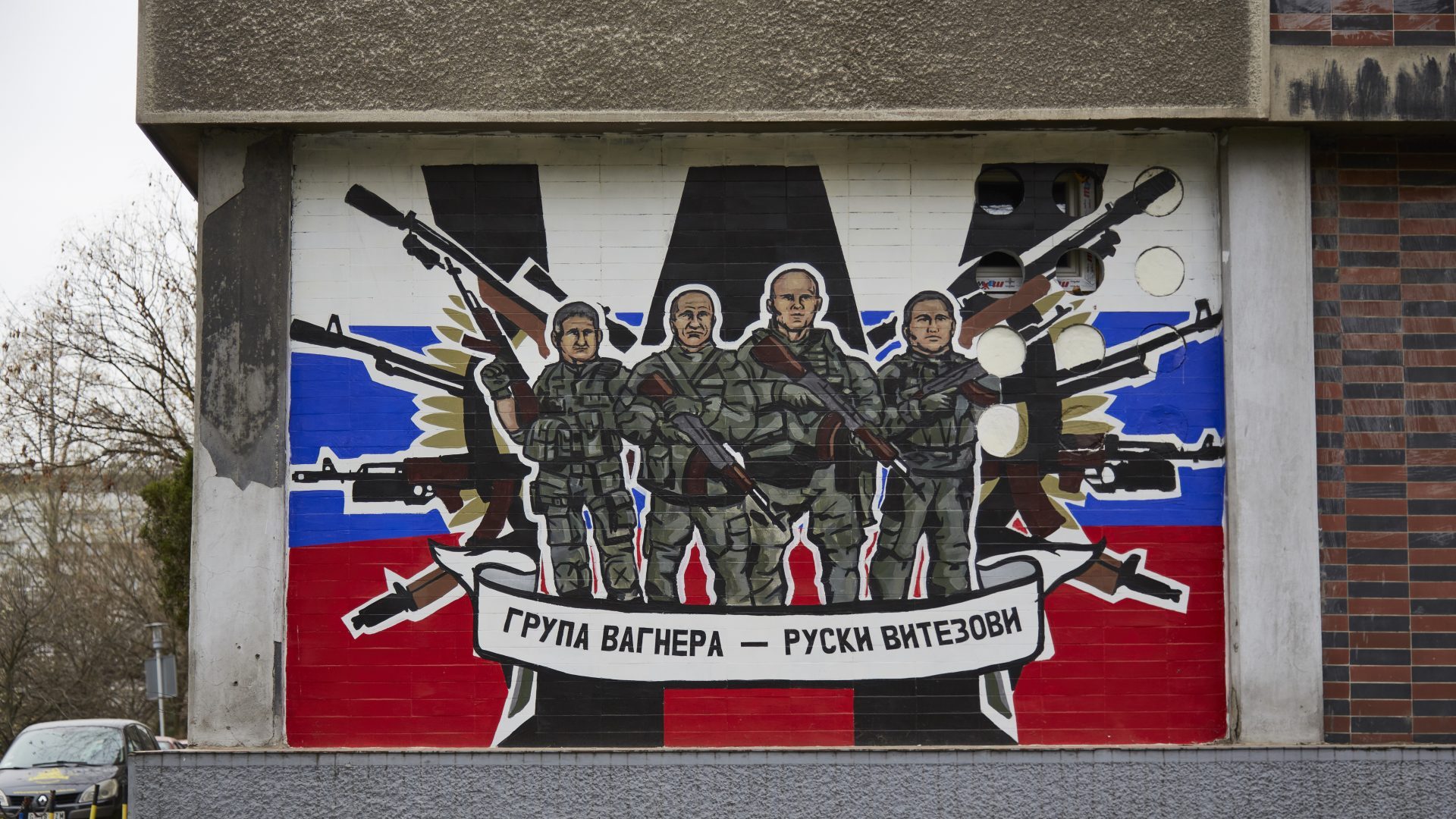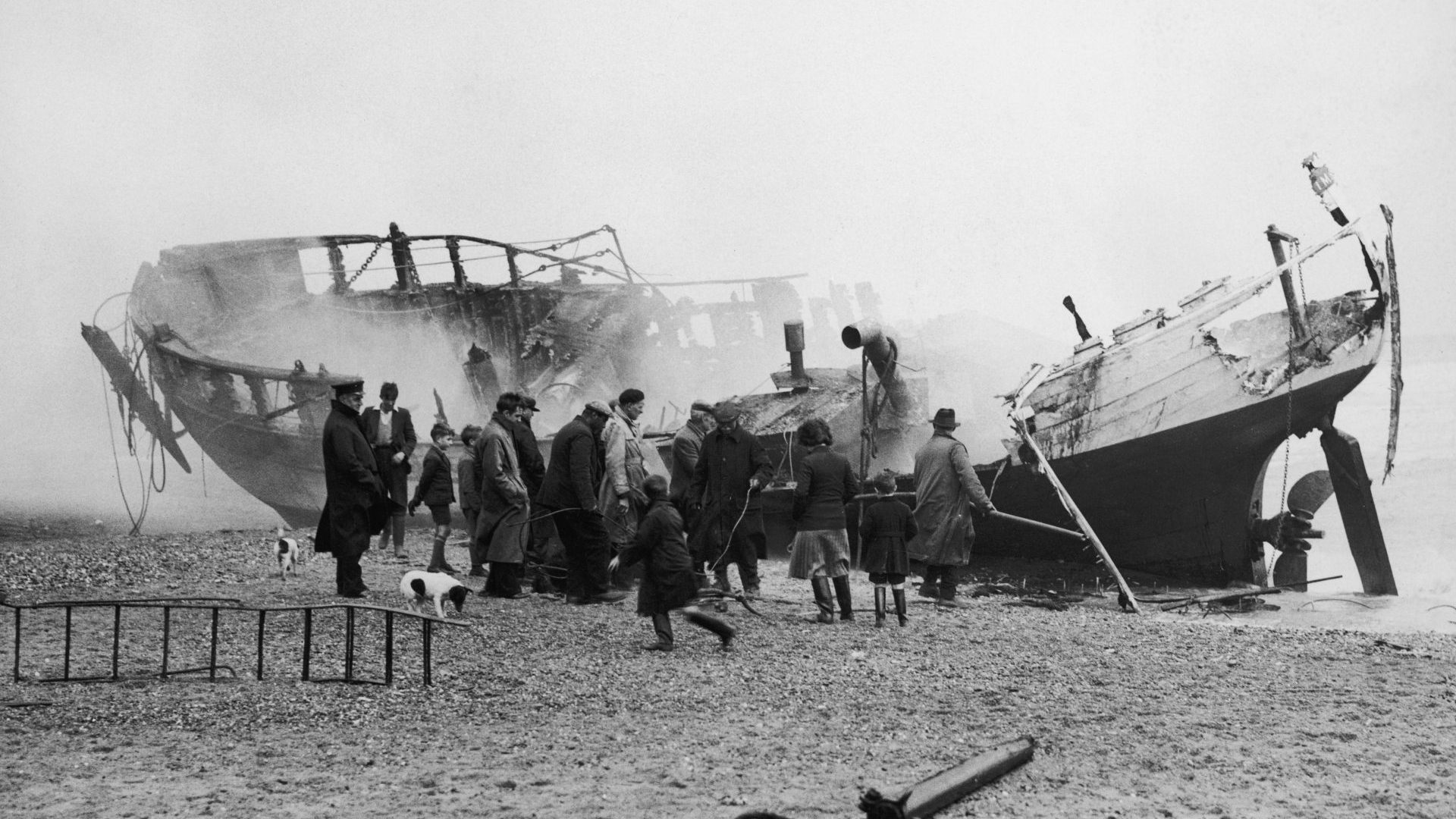This article was originally published in December 2022. It is being rerun today in the light of Yevgeny Prigozhin’s reported death
On the final day of 2022, a former hot-dog salesman turned oligarch who has become one of Vladimir Putin’s closest allies, and is now mentioned as his potential successor, visited troops from his mercenary force near the eastern front of the war with Ukraine. Despite the date, this was not a time for celebration.
Instead, the head of the Wagner Group was videoed in a basement in the key Donbas city of Bakhmut, watching emotionlessly as body bags containing his dead soldiers were stacked up. “Their contracts have finished. They will go home next week,” he can be heard saying. “These are getting ready to be sent. We all work during New Year’s Eve.” And then Yevgeny Prigozhin adds: “Happy New Year.”
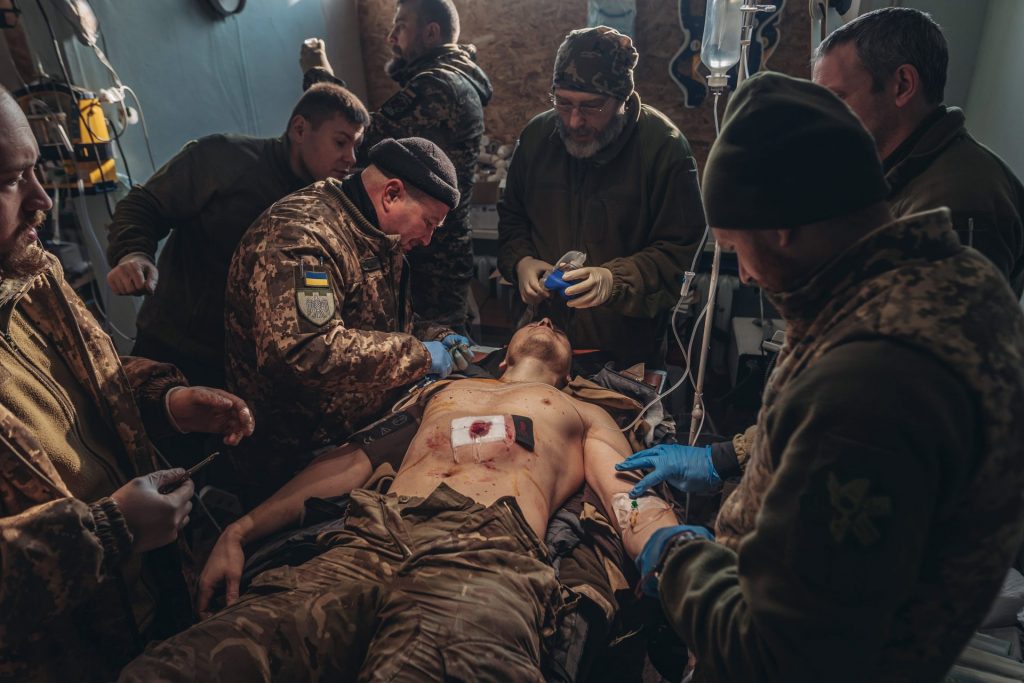
Ukraine has been a rare setback for Prigozhin’s private army, which first appeared in 2014 and has since left a bloody trail across eastern Europe, the Middle East and Africa. According to the Pentagon, it is comprised of around 50,000 men, only a fifth of whom are professionally trained soldiers. The others are recruited from prisons.
Securing the group’s participation in conflicts on the side of Russian interests is claimed to cost the Kremlin £1bn a year, but there are other potential benefits for Prigozhin. He is thought to be in Bakhmut as he has been promised control of salt and gypsum mines there following a Russian victory.
The Wagner Group has been in Ukraine from the beginning. From even before the beginning, in fact – some of its earliest known activities came in the Donbas during the 2014 offensive. Then, when Russian forces crossed the border on February 24, 2022, several mobile phones that had previously been detected in Libya, Syria and, most recently, the Central African Republic (CAR) could be seen pinging near key infrastructure sites in Kyiv, including the residence of the president, Volodymyr Zelensky.
Three days after the invasion, a US official stated that there were indications that Prigozhin’s forces were operating in Kyiv. On March 3, the Times reported that Zelensky had survived three assassination attempts, two by Wagner operatives.
As the war has progressed, some of the worst atrocities have been linked to the group, including the videoed murder by sledgehammer of Yevgeny Nuzhin, a Russian prisoner who became a Wagner recruit in Ukraine but who turned himself in to Zelensky’s forces and was returned to Russia in a POW exchange. In October, Russian dissident Mikhail Khodorkovsky told a parliamentary committee that the leaders of the Wagner Group now have as much influence in the Kremlin as the foreign and defence ministers.
Before this latest phase of the war, Wagner had tried to remain out of the media spotlight. It has risen in influence and profile, but its story of resourcegrabbing, election interference, attempted coups, war crimes and torture across multiple countries is not well known.
Prigozhin – himself a former convict who served a long sentence for theft and later was nicknamed “Putin’s chef” when his Concord Management catering business and restaurants became favourites of the dictator – only finally admitted his ownership of the group in September, after a video went viral that showed him recruiting for Wagner in a Russian prison. Now, as the advance on Bakhmut stalls, he has become increasingly outspoken about the failure of the Russian military leadership to supply his men with ammunition.
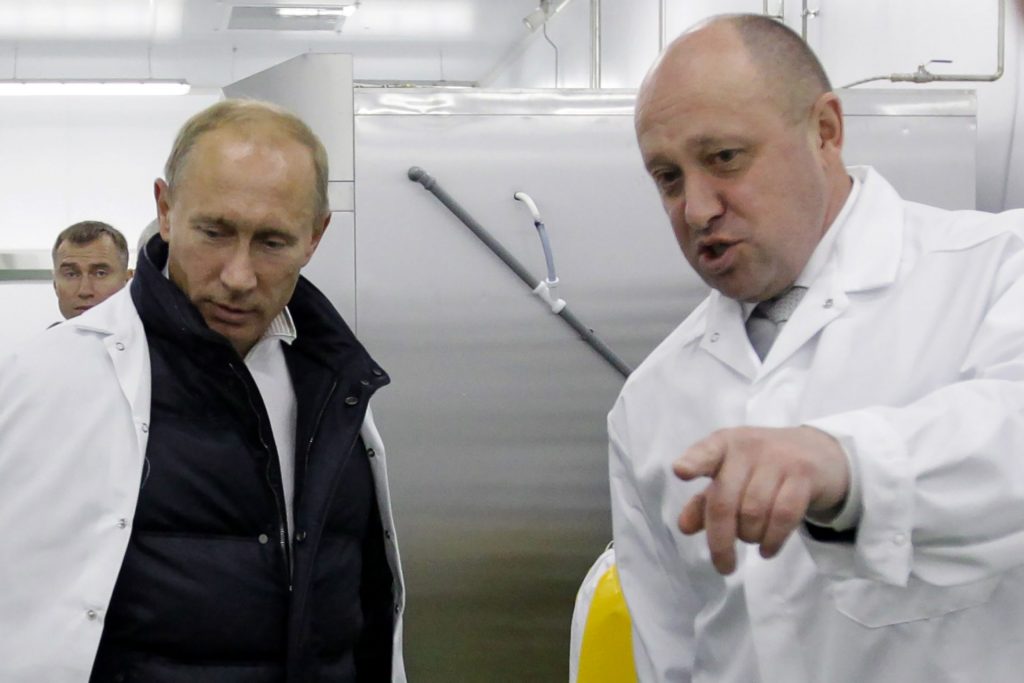
Understanding Wagner can give us an insight into Putin’s hybrid war and the Russian government’s practice of vranyo, telling lies they know no one will believe, which as well as spreading confusion demonstrates Putin’s contempt for the West. In addition, Wagner highlights the wider dangers that arise from this new type of private military organisation.
The idea that a company might have military capabilities is not new. From 1600 to 1874 the British East India Company traded with, and invaded and occupied, countries in the Indian Ocean using the 260,000 troops in its three “presidency armies” (over twice the number in the modern British army). Modern private military firms trace their origins back to Watchguard International, launched in 1965 by David Stirling, the founder of the Special Air Service. After being deployed in Yemen to support royalist forces, the company went on to operate in Zambia and Sierra Leone, providing training teams and advising on security matters as well as selling weapons, training, and military personnel to several Gulf states. In 1971 Watchguard was involved in a failed attempt to overthrow Colonel Gaddafi in Libya.
At the end of the cold war, as western militaries shrank, there was an increase in the number of private security operations. The biggest boom for the industry, however, was in the early 2000s, after the invasions of Afghanistan and Iraq, when firms such as Blackwater (now Constellis Group) picked up multimillion-dollar contracts from the US government.
The contractor gold rush meant that quite a few individuals with exaggerated resumés got into positions for which they were not trained. I found this out at first hand one day, when driving through Baghdad from the international zone to the airport. The traffic was heavy and I pulled up close to the shabby-looking 4×4 in front, which turned out to be operated by a military contractor – the boot suddenly opened to reveal a figure wearing what looked like a first world war German helmet pointing an AK-variant rifle at me. I held up my A4 laminated union jack as we slowed down, but even this did not make him lower his rifle.
I was lucky – others were less so. In 2007 Blackwater contractors killed 17 civilians in Nisour Square in Baghdad while escorting a US embassy convoy. An FBI investigation found that, of the 17 Iraqis killed, at least 14 were shot without cause. Four contractors were convicted in 2014, but in 2020 all of them were pardoned by Donald Trump.
Wagner, however, is unlike any other military contractor, due to both its activities and its relationship with the Russian state. It is used by the Kremlin to provide plausible deniability in certain conflicts, and to obscure from the public the number of casualties and financial costs of Russia’s foreign interventions, even though private military contractors are not permitted under Russian law. In 2017, the chief of Ukraine’s security service, Vasyl Hrytsak, claimed that Wagner was “a private army of Putin”. There’s no doubt that its links with the Russian state run deep. The company shares bases with the Russian military, is transported by Russian military aircraft, and even uses Russia’s military healthcare services.
Wagner members have been awarded Russian military honours in the form of decorations and certificates signed by Putin, and the Wagner commanders Andrey Bogatov and Andrey Troshev were given the Hero of the Russian Federation award for assisting in the first capture of Palmyra, Syria, in 2016. Dmitry Utkin, Prigozhin’s former head of security, has won the Order of Courage four times. He was seen in the Kremlin during the celebration of Fatherland’s Heroes Day in 2016 and was photographed with Putin. Utkin also led the Wagner Group on its first deployments to Crimea and Donbas in 2014, where they fought alongside pro-Russian separatists, before deploying to Syria in 2015 in support of President Assad’s regime.
Reportedly, Utkin has a passion for the history of the Third Reich and used the call sign “Wagner” when serving in the Russian special forces in honour of Richard Wagner, Hitler’s favourite composer. This is said to have given the group its name. Images that surfaced in 2021 show Utkin with Waffen-SS collar tabs and Reichsadler (Imperial Eagle) tattoos. He is a believer in a strain of religious thinking known as Rodnover, which, similar to Nazi and wider fascist thought, emphasises the good of the collective over the rights of the individual. It is in effect a form of pagan religion whose beliefs are often expressed through hardline nationalism, the primacy of Slavic ethnicity, and the belief in fundamental differences between racial groups.
Various elements of Wagner have been linked to far right extremists, such as the openly neo-Nazi Rusich unit that reports into Wagner in Ukraine. “Rusich” means a member of the old Rus’ people; its ideology is a mix of Rodnover, Nazism, and extreme Russian nationalism. In 2014 Rusich emerged as one of the “volunteer battalions” in pro-Russian rebel-held parts of the Donbas, drawing its volunteers from the St Petersburg neo-nationalist underground.
Wagner members have left neo-Nazi graffiti on the battlefield and the group itself has associations with the ultranationalist, white supremacist group the Russian Imperialist Movement (RIM), which is designated a terrorist group by the US (but not the UK). Despite the claim by Erica Gaston, from the UN University Centre for Policy Research, that Wagner is not ideologically driven but rather a network of mercenaries “linked to the Russian security state”, it clearly contains elements that are bound by extreme ideological beliefs.
As I have previously explained in TNE, extreme-right individuals linked to the Russian state have developed global networks that include people in the UK. This raises the possibility of extreme-right individuals from across Europe volunteering for the Wagner organisation. Christopher Miller, the former director of the US National Counterterrorism Center, has confirmed that American neo-Nazis have already travelled to Russia to train with RIM. In 2022, the German government confirmed that members of the German Young Nationalists movement and the German neo-Nazi group “Third Way” also trained in Russia with the RIM.
Wagner is not one company, but an opaque network of subsidiaries and complementary companies. These include Prigozhin’s Internet Research Agency, whose “troll factories” employ fake accounts registered on social networking sites, discussion boards, online media sites and video hosting services to promote the Kremlin’s interests in domestic and foreign policy and attempt to incite disorder and chaos in the West. This potentially includes narratives that fan the flames of far-right conspiracies, pushing individuals further down the path towards terrorist violence as well as subverting democracy.
Prigozhin recently responded to a Bloomberg report claiming that Russia was interfering in the US midterms. In a statement posted by Concord, Prigozhin claimed: “Gentlemen, we interfered, we are interfering, and we will interfere.”
While their influence has grown and their criminal activities have escalated, Wagner and Prigozhin have not been able to act with complete impunity. Prigozhin was sanctioned by the US Treasury Department in 2016 for Russia’s involvement in the Ukraine conflict. In 2017 they also imposed sanctions on both the Wagner Group and Utkin. In 2021, the EU imposed restrictive measures against Utkin and others associated with Wagner.
Utkin was accused of being “responsible for… torture and extrajudicial, summary or arbitrary executions and killings”. Following the invasion of Ukraine in 2022, Canada, the UK, Australia and Japan all placed sanctions on the group.
Further sanctions have been implemented for its activities in Africa. According to a spokesperson for the US’s Africa Command, Wagner operates in at least 16 African countries. It is used to obscure Moscow’s direct role. The services Wagner provides are often tied to contracts for Russia to extract raw materials. In exchange for security services in the CAR, Mali and Sudan, Wagner has secured exclusive rights to gold and diamond mining for Russian companies whose profits help to fill Putin’s war chest.
Wagner arrived in Madagascar in 2018 to guard consultants hired by Prigozhin to support Hery Rajaonarimampianina’s presidential re-election campaign. He did not win, but one of the last acts of his administration was to facilitate a Russian firm’s takeover of Madagascar’s national chromite producer. Wagner was employed to guard the mines.
Similar activity was seen in Syria where, by 2017, a Kremlin policy stated that companies that seized oil and gas wells and mines from Islamic State forces would get the rights for those sites. Two Russian companies received contracts under this policy, with one employing Wagner to secure the sites from the militants, and the group received 25% of the profits from the captured oil and gas fields.
Wagner is still in Libya, CAR, Sudan and Burkina Faso. When France and the UK wrapped up their counterterrorism operations in Mali, the government turned to Wagner. By gaining influence in these countries, Russia is now not just able to seize resources needed by Moscow, but also to manipulate conflicts in a deniable way, and control refugee flows into Europe, a weapon of hybrid war that has been used to great effect via Russia’s proxy, Belarus. In 2021, its president, Alexander Lukashenko, threatened to “flood” the EU with armed migrants. He proceeded to help tens of thousands of immigrants get into his country and provided them with advice and support to further cross into the EU.
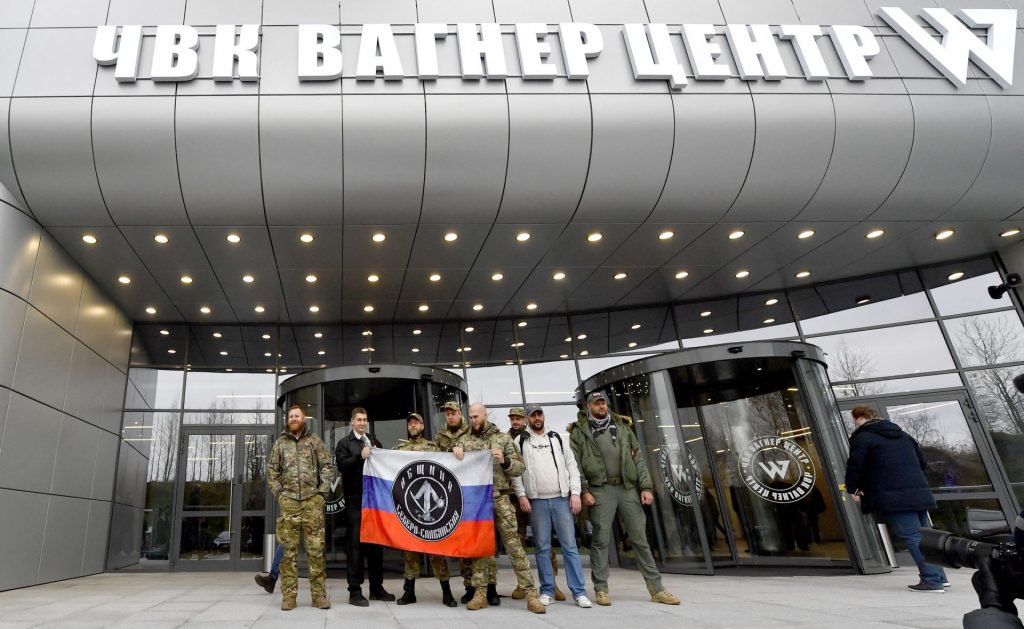
Wagner’s activities in Africa provide examples of Russia’s other hybrid tactics. Wagner contractors were sent to the CAR to protect mines, support the government, train the military, and to protect President Touadéra. By 2020 Wagner troops were fighting alongside the country’s military in the civil war that had been raging since 2012. In 2021, the UN High Commissioner for Human Rights received reports of mass executions, arbitrary detentions, torture and forced displacement of civilians by private military forces including Wagner. This was the first of several such reports. In 2022, Human Rights Watch called on the international criminal court to prosecute Wagner for activities in the CAR.
Moscow denies the group’s presence in that country; however, the Kremlin has funded a movie called The Touriste, which tells the story of Wagner’s activities there (minus the atrocities). The movie was reportedly financed by Prigozhin to improve Wagner’s reputation and even includes some Wagner contractors as extras.
The film tells the story of a military intervention that the film’s sponsor, Russia, denies ever happened. This demonstrates Prigozhin and the Kremlin’s view that, sanctions aside, they will never be held personally accountable for what Wagner has done. Their confidence is such that plausible deniability is now stretched to the point of implausible deniability. The troll factory owner is trolling us; vranyo is taken to another level.
In 2018, Prigozhin, the Internet Research Agency, Concord and other connected Russian individuals were indicted by a US grand jury. Prigozhin was charged with funding and organising operations for the purpose of interference in the US political and electoral processes. And in early November, lawyers in the UK took the first step towards what they said would be groundbreaking legal action against Wagner over allegations that it committed terrorism in Ukraine – the aim is to get reparations for victims of Wagner’s crimes.
Jason McCue, senior partner at McCue Jury and Partners, the firm bringing the case, spoke at the same foreign affairs committee as Khodorkovsky. Asked why Putin is using Wagner, McCue said it “comes down to plausible deniability”. McCue believes there will be a reckoning at the end of the war for crimes committed, and when looking at the worst of the war crimes, especially the targeting of civilians and the use of rape and murder, McCue’s evidence leads to Wagner. Some of this evidence includes communications intercepted by German intelligence that suggests Wagner contractors were involved in atrocities in the Ukrainian town of Bucha, where 458 civilians were killed in the early months of the invasion.
At the same committee, Prof Jason Blazakis of the Middlebury Institute of International Studies said that McCue would show Wagner was conducting “premeditated acts of political violence against non-combatants, with an objective of creating fear in a larger audience, not just the audience they are directing their violence against directly.” For Blazakis they are trying to create an atmosphere of fear, which “is the quintessential definition of terrorism”.
According to a press release from Concord, a hammer with traces of artificial blood was handed over on behalf of Wagner to the European Parliament in response to their recent designation. This case, if successful, could provide impetus to officially designate Wagner as a terrorist organisation, which could open the way to future cases against Putin. It could be the most successful legal route to disrupting their activities, not least because there are no specific legal instruments concerning private military organisations. As we have seen with Wagner so far, this lack of effective legal accountability results in impunity. Wagner highlights the need to deal with that issue.
The privatisation of military force introduces combatants who can circumvent the state-based systems of regulation and ignore internationally recognised sets of norms around war, some of which have been in place since the writings of St Augustine in the early 5th century. The principle of legitimate force that was put forward by Augustine accepts that war can be authorised only by states or international institutions such as the UN.
By restricting which agents can use force, the principle of legitimate authority makes it possible to establish supranational legal and political instruments that regulate warfare, such as the UN Charter and the Geneva Conventions. These provisions help to provide a common framework to reduce the worst atrocities, and hopefully the frequency of combat, by ensuring that the cause of going to war is legitimate, such as in cases of individual or collective self-defence.
The deployment of contractors also allows governments to bypass many of the internal constitutional and parliamentary constraints on the decision to send troops into action, allowing governments to deploy military power without public debate.
Although states that employ private companies are subject to international laws, states can deny a direct relationship, as Russia has with Wagner. Indeed, in some cases there is no direct relationship, and the outfit is purely operating for profit, not following a political agenda as Wagner does. The idea of individuals fighting and potentially killing for money rather than their country is uncomfortable and disconcerting – but soldiers sign up for many reasons and some of the worst wartime atrocities have been committed by men fighting for national and religious causes, rather than money.
But now, states can pass cyber weapons to contractors, to attack opposition infrastructure – to shut down medical life-support systems in hospitals or bring down passenger aircraft – and the trail back to them will be even harder to prove. The already ethically complex use of autonomous weapons by states becomes even more problematic in terms of accountability when they are put in the hands of privately controlled entities. The selection and training of human contractors can also create ethical issues, as they are free from the scrutiny under which soldiers of state militaries operate. Selecting serving prisoners as Wagner is doing takes this to another level.
Conflict will always play a part in maintaining the uneasy equilibrium in which our competing societies and ideologies find themselves. War is as much a part of our species as our ability to love. We should, however, do all we can to avoid conflict, and when it does come, in the words of Augustine, we should wage war “without love of violence, cruelty, or enmity”. Atrocities in one war spark cycles of revenge that can start the next. Existing frameworks are by no means perfect, but private military companies can exploit these imperfections in a way that states cannot.
For almost a decade Prigozhin’s Wagner Group committed atrocities in Africa and, aside from a few investigative journalists, lawyers, academics and government officials, no one in the West cared very much. Russia’s blunders in Ukraine, and the many tragic events there, have turned a spotlight on them that may, through the work of people like Jason McCue, result in justice for some of their victims, and disrupt their future activities.
The case of Wagner, however, highlights a wider issue. We need to further develop existing frameworks to ensure both the political leaders who use these groups and the men who fight in them face the same scrutiny as regular armies. If this prevents just one Bucha, it will have been worth the effort. Andy Owen is an author and former intelligence officer in the British army

